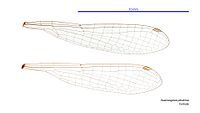Austroagrion pindrina
Appearance
| Pilbara billabongfly | |
|---|---|

| |
| Mating pair | |
| Scientific classification | |
| Domain: | Eukaryota |
| Kingdom: | Animalia |
| Phylum: | Arthropoda |
| Class: | Insecta |
| Order: | Odonata |
| Suborder: | Zygoptera |
| Family: | Coenagrionidae |
| Genus: | Austroagrion |
| Species: | A. pindrina
|
| Binomial name | |
| Austroagrion pindrina | |

| |
Austroagrion pindrina is a species of damselfly in the family Coenagrionidae,[3] commonly known as a Pilbara billabongfly.[4] It is a small damselfly; the male is blue and black.[4] It is endemic to the Pilbara region of Western Australia,[5] where it inhabits streams and still waters.[6]
Gallery
-
Female museum specimen
-
Female wings
-
Male wings
See also
References
Wikimedia Commons has media related to Austroagrion pindrina.
- ^ Dow, R.A. (2017). "Austroagrion pindrina". IUCN Red List of Threatened Species. 2017. IUCN: e.T14263125A59256498. doi:10.2305/IUCN.UK.2017-1.RLTS.T14263125A59256498.en.
- ^ Watson, J.A.L. (1969). "Taxonomy, ecology, and zoogeography of dragonflies (Odonata) from the north-west of Western Australia". Australian Journal of Zoology. 17 (1): 65–112 [68]. doi:10.1071/ZO9690065.
- ^ "Species Austroagrion pindrina Watson, 1969". Australian Faunal Directory. Australian Biological Resources Study. 2012. Retrieved 7 April 2017.
- ^ a b Theischinger, Günther; Hawking, John (2006). The Complete Field Guide to Dragonflies of Australia. Collingwood, Victoria, Australia: CSIRO Publishing. p. 94. ISBN 978-0-64309-073-6.
- ^ Watson, J.A.L.; Theischinger, G.; Abbey, H.M. (1991). The Australian Dragonflies: A Guide to the Identification, Distributions and Habitats of Australian Odonata. Melbourne: CSIRO. ISBN 0643051368.
- ^ Theischinger, Gunther; Endersby, Ian (2009). Identification Guide to the Australian Odonata (PDF). Department of Environment, Climate Change and Water NSW. p. 198. ISBN 978-1-74232-475-3.




